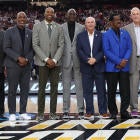New York Knicks guard Derrick Rose and two of his friends, Randall Hampton and Ryan Allen, are scheduled to go to trial this October in a civil case that alleges they took turns raping a woman while she was unconscious at her home on Aug. 27, 2013. There was scant media attention paid to the suit for most of the 13 months since the case was filed, but that has changed as details have emerged and both the trial and the 2016-17 NBA season approach.
Here's a summary of what we know so far, in the form of a timeline:
Oct. 2011: Rose and Doe meet in Los Angeles at a party he hosted
The NBA was in the middle of a lockout. According to Doe (the alleged victim has chosen to keep her name private), this was the beginning of a relationship that escalated to the point where they regularly went to parties, college basketball games and other events together.
April 28, 2012: Rose tears his ACL in a playoff game
Rose would miss the entirety of the 2012-13 season, and most of his recovery and rehab took place in Los Angeles, where he and Doe continued their intimate relationship. According to Doe, Rose gave her a laptop so they could Skype together -- he wanted her to masturbate on camera. In Doe's complaint, she says that she stopped Skyping with him because he would "berate her for refusing." Doe also said she objected to his numerous requests to "involve others in their sex life, in particular, strippers and other couples."
Later in 2012, according to Doe, she repeatedly declined Rose's invitations for her to fly to Chicago, even missing flights that Rose had booked "because she believed that Rose's requests were not genuine." Doe said she was "put off" when she found out that Rose had a girlfriend in Chicago, as she thought they were exclusive.
May 2013: Doe visits Rose in Chicago
Doe finally accepted an invitation to fly to Chicago, and she brought a female friend with her. According to Doe, Rose demanded that she and her friend "stroke each other," and they refused. When Rose showed the friend pictures of his baby, Doe was "shocked because Rose had never mentioned his baby to her." Doe then, according to her complaint, decided not to "pursue a romantic relationship with Rose anymore."
On June 27, however, Rose texted Doe when he flew to Los Angeles, and requested group sex with his friend, Randall Hampton. Doe said no, texting him, "u are clearly showing me our relationship is based on your sexual fantasies." Though they continued messaging occasionally, Rose had essentially broken up with her on July 23 when he texted, "We good but I'm not messing wit u like that anymore."
Aug. 26-27, 2013: The alleged gang rape
On Aug. 26, Rose invited Doe and her friend, Jessica Groff, to a home he was renting in Beverly Hills. Rose sent a driver to pick Doe up, and Doe drank vodka while waiting for the driver, who was three hours late. Doe drank wine in the car on the way to Rose's home, and she and Groff kept drinking when they arrived. Hampton and Ryan Allen, Rose's close friends and assistants, were with Rose at the house. Doe alleges that her drinks were drugged and she was so intoxicated that she burned her hand picking up rocks in a fire pit. Groff stated that Allen told her to take her clothes off and was angry when she wouldn't. Doe and Groff left in a taxi.
While Doe contends that she did not have sex at the Beverly Hills house, the three men all claim to have had "consensual sexual relations" with her there. They all deny having drugged her, and they say they did not know that she was intoxicated.
According to Doe, she needed the cab driver to help her get to her front door, and once inside her apartment, she threw up in the bathroom. Nevertheless, texts were exchanged between Rose and Doe after she left the house. "You need to come to me right now," she texted, but he responded that he wanted her to come back to his house. She refused.
Rose texted Doe, "We on our way," and he went to her apartment with Hampton and Allen.
When they arrived in the early hours of Aug. 27, according to Doe, she did not answer the door, leading to several unanswered calls and texts, including one from Allen saying, "Wake yo ass up." According to Rose, Hampton and Allen, she let them into the building and brought them to her apartment. According to Doe, they found a propped-open door to the building, then entered her often-unlocked apartment.
Doe alleges that all three had sex with her without her consent -- she was unconscious when they came in -- and, the, next morning, she was covered in lubricant, felt sick and was in pain. She was late to work, and, when she eventually lost her job, she linked it to the alleged rape. According to Rose, Doe was awake and consented.
Aug. 26, 2015: Doe files civil suit
The suit was filed in Los Angeles County Superior Court, and then transferred to the U.S. District Court for the Central District of California. This is not a criminal case, and the suit was filed right at the deadline for the two-year statute of limitations for civil cases. California's statute of limitations on criminal charges for sexual violence is six years.
Doe has to convince a jury that she was more-likely-than-not sexually assaulted by Rose, Hampton and Allen. Unlike a criminal case, it does not have to be proven beyond a reasonable doubt. Doe says she did not go to the police initially because she was ashamed and embarrassed about the incident.
June 17, 2016: Rose's deposition
This is when Rose said that he and his friends didn't specifically discuss why they were going to Doe's apartment, but they had an implicit understanding. The now-infamous exchange:
Q: Did either Mr. Hampton or Mr. Allen tell you why they wanted to go to Plaintiff's home on the night in question?
Rose: No. No.
Q: So they just said, 'Hey, it's the middle of the night. Let's go over to Plaintiff's house' and they never gave you a reason why they wanted to go over there?
Rose: No, but we men. You can assume.
Q: I'm sorry?
Rose: I said we men. You can assume. Like we leaving to go over to someone's house at 1:00, there's nothing to talk about.
Also on this date, U.S. District Judge Michael Fitzgerald rejected Rose's request for Jane Doe's identity to be revealed. He ruled that allegations of rape entitled her to anonymity. Judge Fitzgerald also criticized Rose for appearing to "suggest that women who publicly portray themselves as 'sexual' are less likely to experience embarrassment, humiliation, and harassment associated with gang rape." Judge Fitzgerald stated that "such rhetoric has no place in this Court."
June 23, 2016: Jackson says Knicks were 'aware' of situation
A day after acquiring Rose in a trade, Knicks president Phil Jackson took a question about how much the team had investigated the case. "Aware of it," Jackson told reporters, per the New York Daily News. "Investigation is a big word. But aware of it, yes."
July 27, 2016: Rose denied summary judgment to dismiss the case
Judge Fitzgerald denied Rose's request for a summary judgment, as there is a "genuine dispute of material fact as to the central issue in this action." The central issue is whether or not Doe consented to having sex with Rose and his friends.
Sept. 13, 14, 15: Doe speaks out, and it is revealed that Rose didn't know what the word 'consent' meant
For the first time, Doe spoke to the media about the case. In an extensive interview with ThinkProgress' Lindsay Gibbs, she said she wanted to maintain her anonymity because she wants to "keep this away from my mother and father mainly, and possibly the rest of my family members." One of her lawyers, Brandon Anand, revealed that, during Rose's deposition, Rose was asked if he knew the definition of consent. Rose responded, "No, can you tell me?"
Doe also spoke to the Associated Press' Janie McCauley and the New York Daily News' Stefan Bondy before doing a 90-minute conference call with reporters. In the interview with the Daily News, Anand referred to Jackson's statement that "investigation is a big word."
"I think [the Knicks] should've conducted that big word [and called me]," Anand said. "I think I would've shown them the documents that were public, that were fair game, and I think it all speaks for itself. [Rose's] testimony certainly revealed a lot. Just showing them the evidence that's already out, they would've gotten a very clear idea about what actually happened."
Sept. 20, 2017: Judge rules Doe must use her real name
Although Judge Fitzgerald previously allowed Doe to maintain her anonymity, he ruled that, should the case go to trial as planned, Doe will have to use her real name, citing precedent. The judge's fear, according to Sports Illustrated's Michael McCann, is that granting her anonymity might send a message to the jury that the court thinks Rose is likely guilty. Now the only way to preserve her anonymity would be to settle the case.
What happens from here: A settlement or a trial
There is still incentive for both sides to settle the case. From Rose's perspective, going to trial risks permanent damage to his reputation, a possible suspension and the potential triggering of "morals clauses" in his endorsement contracts, such as his Adidas deal that is worth a reported $185 million. From Doe's perspective, a settlement would mean that she doesn't have to live through a potentially painful trial, and she could keep her real name out of headlines. One of Doe's attorneys, Waukeen McCoy, however, told Sports Illustrated that Rose's attorneys won't even respond to emails.
Potential conflict with NBA season
New York will hold media day on Monday, Sep. 26 and start training camp the next day at West Point. Rose will be required to talk to reporters at media day and during training camp.
If no settlement is reached, then the trial will begin on Oct. 4. That is the same day as the Knicks' first preseason game in Houston. It is also Rose's 28th birthday.
Should Rose lose the case, the Knicks or the NBA could choose to suspend Rose. The league, however, typically does not suspend players for losing civil cases.
Resources:
- Deadspin, Here are the details from the Derrick Rose rape lawsuit
- The White Bronco, The Derrick Rose sexual assault trial primer
- The White Bronco, various documents
- ThinkProgress, The disturbing details of the Derrick Rose gang rape case
- Sports Illustrated, Reassessing the details surrounding Derrick Rose's civil sexual assault lawsuit
- SB Nation, The specifics of the Derrick Rose case, as explained by lawyers






















